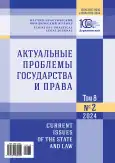The role of legal incentives in ensuring the balance of legal regulation of family relations
- Authors: ZAVGORODNIAIA A.A.1
-
Affiliations:
- Donbass State University of Justice
- Issue: Vol 8, No 2 (2024)
- Pages: 270-278
- Section: Материальное право
- URL: https://journal-vniispk.ru/2587-9340/article/view/303225
- ID: 303225
Cite item
Abstract
The work is devoted to the consideration of legal incentives and their role in ensuring balance on the example of legal regulation of family relations. Thus, in relationships, an important role is played by optimizing not only the ways of legal regulation of these relationships, but also the ways of influencing the behavior of its participants, among which it is necessary to identify legal incentives as ways that will be the most loyal and appropriate to the nature and nature of the relevant relationship. The subject of the work is the analysis of legal regulation on the volitional interaction of subjects, which involves the coordination of the will of legally equal subjects of legal regulatory activity (contractual, autonomous), the essence of which determines the methods of legal regulation, also the subject will be directly ways to influence the behavior of its participants, among which legal incentives (as methods) are distinguished. The priority of legal incentives is of decisive importance, since it allows taking into account the interests of subjects of private relations as much as possible. The purpose of the work is to consider the priority of legal incentives and identify them as ways of positive legal impact when balancing, in particular, the legal regulation of family relations. The methodological basis of the research was: general and private scientific methods, namely logical, functional, formal and legal; techniques such as description, analysis, generalization, abstraction are used. The work notes that the choice of an additional individual contractual method of legal regulation of family relations is decisive in the formation of socially active lawful behavior of various subjects of law, since reasonable freedom and equality in the choice of legal means, the possibility of establishing an “individual” legal regime are provided. Regulation of relations in a private way is inherent where the interest of the subject is closely related to the personality, individualized. Thus, the incentive for using the contractual method of regulating family relations is the desire (will) of the subject to “reinforce” their legal guarantees of the exercise of personal non-property rights, which allows us to talk about the balance of legal regulation of this group of legal relations in accordance with the interests of spouses, spouses as parents. Despite the inconsistency of contractual regulation of personal non-property legal relations of spouses in the domestic legal system, it is noted that this does not contradict the essence of the legal relations themselves and the principles of law, can play an important protective role in the mechanism of legal regulation. Therefore, contractual regulation is characterized by consistency of interests, which is the main factor in the formation of lawful behavior of legal entities.
About the authors
Anastacija A. ZAVGORODNIAIA
Donbass State University of Justice
Author for correspondence.
Email: nastacija@mail.ru
ORCID iD: 0000-0001-5120-7018
PhD (Law), Associate Professor, Associate Professor of Civil Law Disciplines Department
Russian Federation, 9 Lebedinsky St., Donetsk, 283049, Donetsk People’s RepublicReferences
- Bakulina L.T. (2019). Obshchaya teoriya dogovornogo pravovogo regulirovaniya: dis. … d-ra yurid. nauk [General Theory Of Contractual Legal Regulation. PhD (Law) diss.]. Moscow, 440 p. (In Russ.) https://elibrary.ru/wjhbbm
- Mal’ko A.V. (2012). Stimuly i ogranicheniya v prave: Teoretiko-informatsionnyi aspect [Incentives and Restrictions in Law: Information-Theoretic Aspect]. Saarbrucken, Lap Lambert Publ., 363 p. (In Russ.) https://elibrary.ru/qzekez
- Petrazhitskii L.I. (1907). Teoriya prava i gosudarstva v svyazi s teoriei nravstvennosti [Theory of Law and State in Connection with the Theory of Morality]. St. Petersburg, Printing House of Saint-Petersburg Joint-Stock Company “Slovo”, vol. 2, p. 309-656. (In Russ.)
- Marchenko M.N. (executive ed.). (2002). Obshchaya teoriya gosudarstva i prava. Akademicheskii kurs: v 3 t. [General Theory of State and Law. Academic Course: 3 vols.]. Moscow, Zertsalo-M Publ., vol. 3, 528 p. (In Russ.)
- Subochev V.V. (2007). Zakonnye interesy v mekhanizme pravovogo regulirovaniya [Legitimate Interests in the Mechanism of Legal Regulation]. Moscow, 226 p. (In Russ.) https://elibrary.ru/qxjfgp
- Chashkova S.Yu. (2014). Sistema dogovornykh obyazatel’stv v rossiiskom semeinom prave: avtoref. dis. … kand. yurid. nauk [The System of Contractual Obligations in Russian Family Law. PhD (Law) diss. abstr.]. Moscow, 23 p. (In Russ.) https://elibrary.ru/nhvqvv
- Grivko A.A. (2017). Dogovornoe regulirovanie neimushchestvennykh otnoshenii suprugov: perspektivy razvitiya [Contractual regulation of non-property relations between spouses: development prospects]. Materialy 6 Mezhdunarodnoi nauchnoi konferentsii «Yuridicheskie nauki: problemy i perspektivy» [Proceedings of the 6th International Scientific Conference “Legal Sciences: Problems and Prospects”]. Kazan, Buk Publ., pp. 49-51. (In Russ.) https://elibrary.ru/zjmsjb
- Sanginova M.A. (2018). The problem of inconsistency of personal non-property and property relations of the institute of the marriage contract. Baltiiskii gumanitarnyi zhurnal = Baltic Humanitarian Journal, vol. 7, no. 3 (24), pp. 362-363. (In Russ.) https://elibrary.ru/ykkinn
- Lyudvig S.D. (2020). Problems of recognizing spouses’ property as their personal property. Ekonomika. Pravo. Obshchestvo = Economy. Law. Society, no. 5 (3), pp. 27-31. (In Russ.) https://elibrary.ru/pawyli
- Aleksandrova M.A., Fedorova O.A. (2021). Features of the legal regime governing the personal property of spouses in Russia. Vestnik Sankt-Peterburgskogo universiteta. Pravo = Vestnik of Saint Petersburg University. Law, vol. 12, no. 2, pp. 319-333. (In Russ.) https://doi.org/10.21638/spbu14.2021.205, https://elibrary.ru/pbzczf
Supplementary files








